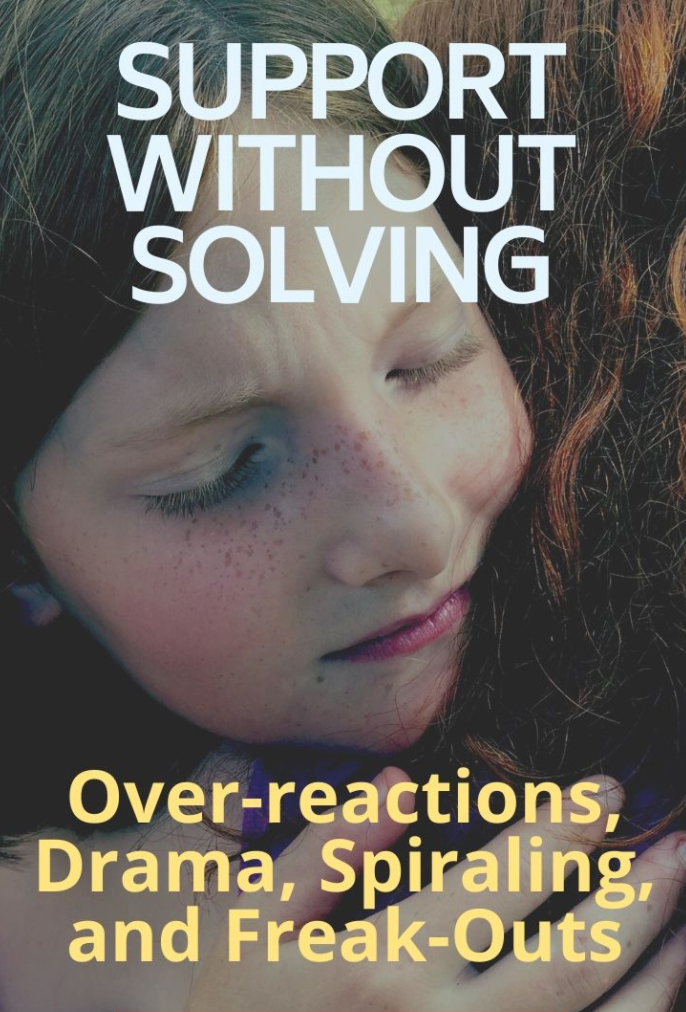Over-reactions, Drama, Spiraling and Freak-Outs: How to help when emotions run high.
Nov 03, 2019
This week’s blogpost is inspired by a session I had with a client of mine a few weeks ago. Her 8-year-old daughter was hurting from friend drama and would come home from school beside herself with hurt feelings and anger about a particular friend who seemed to perfectly align with all her tender spots.
Mom's first reaction was to try to find out exactly what happened, deduce who was at fault and what part her daughter may have played in the problem, give feedback on what she may have done wrong or how she may have misinterpreted things, and then suggest what to do differently next time.
Can you guess how all of that went down? Tearful sadness quickly transformed into anger at mom and the whole thing would end with, "You don't GET IT MOM!!!" and a slammed bedroom door, followed my more muffled sobs.
Sound familiar?
Motherhood so often seems to be about solving problems, and when our kids come to us with problems, it is SO hard to resist analyzing and suggesting solutions. But, the truth is that problem-solving and analysis only ADDS to a kiddo drama attack.

So what SHOULD we do when our child's emotions are pouring out of them in a crazy drama spiral? Here are the steps I like to walk my clients through. Learning how to stick to this pattern is harder than it looks, but it's a game-changer when you master it.
1) Separate your own trauma/emotions:
Are you seeing similarities from your own past in your child's emotions or challenges? Join the club! But you see them because most of these struggles are universal, not because your child is mirroring something that made your childhood uniquely terrible (even though it felt that way!).
And, those specific things that may be particularly painful for you to remember or see in your child, are yours and yours alone; letting them spill into this moment with them will only diminish your ability to see what they really need from you.
It's SO important to heal and deal...on your own time.
That doesn't mean you should ignore or push down your reaction - pay attention to how you feel! As a coach, these moments are extremely helpful; they're like a spotlight leading me to where we need to go.
2) Support WITHOUT Solving:
Now that you aren't distracted by your own past trauma, you can put your full attention on your child.
Compassion, love and safety are the primary focus here. But what about dealing with the problem? I promise that starting here has a much higher likelihood of ending with a solution than jumping right to problem-solving from the beginning.
With my clients, I walk them through 4 steps:
-
Validate (“I can see that really upset you.”)
-
Empathize (“Something similar happened to me,” or, “I would feel the same way”...)
-
Give confidence (“If anyone can handle this, it’s you.”)
-
Be a resource (“Let me know if you want some ideas.”)
Seems simple, right? It's not as easy as it looks; we have to rewire our knee-jerk reactions, and that doesn't happen just by reading a blogpost.
If you've been reading my stuff about improving your parenting tactics but still feel stuck getting there, it might be time for us to talk. There's something magical that happens when you get some objective feedback and insight - book a free strategy session and see what I mean.
Reach out and let's get you some momentum!
Want in on more discussions like this? Join the Real Life Momming Facebook group where we talk all things parenting!
